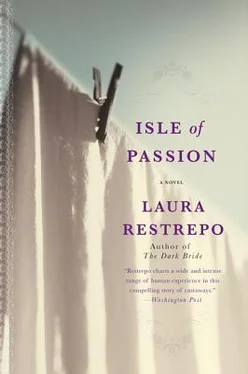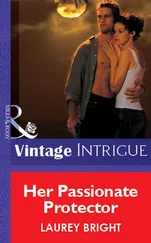Last, she put the wad of bills into her pocket, lifted Angel, and took her other children by the hand. Dressed in that manner, although barefoot, they all walked toward the boat. Alicia asked Lieutenant Kerr to allow the bluejackets to help her by bringing her trunk on board.
“All right,” said the lieutenant, “provided it is only one.”
Tirsa and Altagracia were already on board with the other children, a barrel full of things, and the two pigs. Rosalía and Francisca came last. They stood in front of Alicia, their eyes downcast.
“Hurry up, we’re ready to leave,” said Alicia.
“No, ma’am. We are not leaving. We are staying.”
“How come?”
“Here is where our dead are, and we cannot leave them.”
“Our dead,” said Alicia, “have been blown by the wind, swallowed by the sea, and by now they must be flying over Africa or sailing around Europe. So, come on, quick, let’s go.”
The bluejackets first carried the children and the women, then brought the trunk on their shoulders, climbed on their boat, and rowed toward the Yorktown . It was already four o’clock when they left Clipperton.
From the sea, Lieutenant Kerr looked at the empty atoll, barren, inhospitable, disquieting, and wondered how it was that these people had been able to survive there for so many years without dying of loneliness and boredom. He saw the ruins of miserable huts; a sad cemetery with a half-dozen fallen crosses; an unhealthy lagoon; a ragged, jagged, uninviting cliff; and some debris on the beach, among which was the hull of a sunken ship, an old mattress full of holes, some rags, and the battered body of a bald doll. Alicia was also looking at Clipperton, but it presented itself before her as full of joys and sorrows, the stage where her life had been played. She bid farewell to the invisible wooden houses with cool verandas still resonating love words that she could repeat in their entirety by heart; to the mild prehistoric monsters at the bottom of the lagoon; to the caves that hid from the heavens the sickness and suffering of the scurvy epidemic; to the magnificent chalices that the English pirates had buried after desecrating them with Jamaican rum; to the live rock that cradled the bones of loved ones as well as hated ones; to the tablecloths and bedsheets embroidered lovingly days before her wedding; to the walls guarding against the hurricane’s fury; to the wrecked ghost ship that brought the twelve Dutch sailors; to her daughters’ porcelain doll; to the lamb’s wool mattress where her children were conceived, and brought into this world. To Secundino Angel Cardona’s seductive laughter and the heroic and violent battle that her husband, Captain Ramón Arnaud, had undertaken against no one, ultimately at the cost of his life.
From the ship’s bridge, Captain Perril, who had been alarmed by the delayed return of the boat, was astonished at the spectacle of women and children from the isle climbing into the gunboat. He had to keep his curiosity in check for twenty minutes, until Lieutenant Kerr came on board, explained the visitors’ presence, told him whatever he had been able to understand of their tragic story, and relayed their petition to be taken to Salina Cruz.
Perril asked all the castaways to come aboard, welcomed them warmly, gave them boxes of chocolates as gifts, and ordered the preparation of the watchkeeper’s quarters, which had sanitary facilities. He personally supervised a menu, palatable enough but appropriate for their digestive systems, which were unaccustomed to oils and spices. About two hours later, the Clipperton survivors were taken to the dining room, where the children became the center of attention for the sailors, who joked with them and made faces. This resulted in their crying and running for cover behind their mothers. They were served chicken breasts Maryland, mashed potatoes, salad greens, milk, and apples.
After dinner, Captain Perril took Alicia to his cabin for the customary official questioning, with the help of Dr. Ross, who spoke some Spanish.
“Could I serve you something to drink, a liqueur perhaps?” he asked to break the ice. She said no thanks.
“I would like to know what day is today,” Alicia asked.
She was told it was Wednesday, 18 July 1917.
“How strange,” she commented, “we thought it was Monday, 16 July 1916. We were off by only two days, but we obliterated a whole year. I do not know how this could happen.”
“Don’t give it another thought,” Perril answered. “If according to you we are in 1916, we shall make it 1916. I like that number.”
She was asked for names, dates, events, and motivations. They found out all the hows and whys. She answered as accurately as she could, in the English she had learned under the nuns’ guidance in her adolescence, and which up to that moment she had only used to write love letters to Ramón. Perril wrote everything down, and when they finished, he asked if she would like to accompany him for some fresh air on deck, to take advantage of such a pleasant evening. Dr. Ross decided to retire, concluding that they no longer needed his services as translator in order to understand each other.
Looking at the ocean and enjoying the evening breeze, Captain Perril wished to express to Mrs. Arnaud the profound sympathy he felt for their misfortune and his admiration for the courageous way in which they had preserved the lives of adults and children. He put phrases together in his head, he had them at the tip of his tongue, but he could not articulate any of them. He was surprised to find himself insecure and bashful in the presence of this woman dressed in such an old-fashioned way and who, in spite of everything, still impressed him as beautiful.
“Don’t you have a special desire, or wish for anything in particular?” Perril managed to say. “I would like very much to be able to please you, after the many years of deprivation that you had to suffer.”
She thought about it for a moment, and told him there was something, that she would like to have some orange juice. The captain ordered a tall glass for her, and while drinking it, Alicia commented that if they had not lacked this on the isle, many lives would have been saved. From there, she told him about the scurvy episode. Then he told her about the world war, and she spoke about Victoriano; he informed her about the Russian Revolution, and she explained how they used to catch boobies. So he told her about the death of Emperor Francis Joseph I, and time went fast without their realizing it. They had engaged in a conversation that lasted until one o’clock in the morning and which they ended just because it grew too cold on deck. Before going in, the captain confessed his worries of that morning about approaching the atoll.
“Those underwater reefs,” he commented, “make navigation in that area a very delicate matter. I am happy we are already far away from that place.”
“However, I have already begun to feel nostalgia for it,” she said, smiling.
While he accompanied her to the cabin where the other women and the children had already retired earlier, Perril had one more question.
“Please tell me, Mrs. Arnaud, were those nine years a real torment for you?”
She gave it careful thought, weighed the good and the bad, and answered him with honesty.
“They were bearable, Captain. Thanks.”
After wishing her happy dreams on the first night of her new life, Perril went to the radio room. Together with the radio operator until three in the morning, he tried to send a radiogram to the British consul in Acapulco, who was also in charge of U.S. affairs, with the notification of the ship’s expected arrival at Salina Cruz in four days’ time, and of the survivors he had rescued from Clipperton Island. This accomplished, he retired to his cabin, but since he was not able to sleep, he made some informal notes in his diary.
Читать дальше












